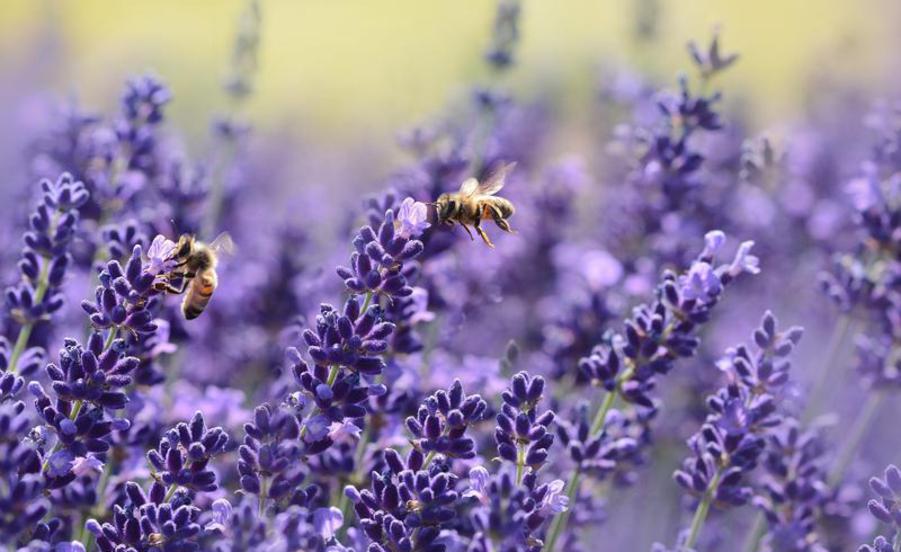by Mikal Wix
January 24, 2024
Mikal Wix lives in the American South, which seeds insight into many outlooks, including revenant visions from the closet. Their work can be found or is forthcoming in Corvus Review, Olit, Berkeley Poetry Review, Tahoma Literary Review, Roi Fainéant Press, decomp journal, and elsewhere, and works as a science editor by day.
A Dream in Which I am Playing with Bees by RK Fauth; Texas Tech University Press; 90 pages; $22.95.
RK Fauth won the 2023 Walt McDonald First-Book Prize in Poetry by series editor and poet, Rachel Mennies, for Texas Tech University Press. In the introduction to this new collection of poems, A Dream in Which I Am Playing with Bees, Fauth tells us that the subsequent verses are “artifacts” of a fictional world. This invented realm is envisioned to be a place bereft of a significant slice of natural and semiotic lushness because of the extinction of the bee. The book itself is more of an assemblage of testimonies that support the imagined environment — a group of artifacts (poems) uncovered in the same archeological (fabled) context. In the aftermath of this chimerical calamity, the writer finds a space of infinite reflection wherein the intrinsic values of these precious creatures are examined in hindsight. The poetry doesn’t follow the literal echoes of such a loss as much as the infinitude of metaphorical and cultural ripples, growing the more they spread through our dreams, our language, and our identities.
In the 1855 preface of Leaves of Grass, Walt Whitman writes that people expect poets to show them “the path between reality and their souls.” Fauth answers this expectation by revealing how integral language is among the many varied tendrils of the bee’s effects on humanity over the centuries. When referring to the swarm’s impact, the poem, “Propolis: Gummy, Made for Sealing Crevices,” reflects on the bee’s vast empire: “…for treat. Meant for burns and ulcers…this sterile resin of alder, and poplar, and conifer… and all the strong words in poems, smeared on the mandible of a bee.” James Longenbach argues in The Virtues of Poetry that this path, in which the poet must traverse in verse, is constituted by “the material language of poetry, the work of diction and syntax.” And Fauth propounds on this discourse about finding our souls from within our reality by illustrating how language itself operates like garden path stones, set down across time, to point the way to find our souls. In “Out In Your Country,” the speaker wonders about the origins of words and expressions: to take a drive; to ruminate; “As if a poem is what’s at the bottom of a bunch of bees….” Fauth reminds us that etymology makes legacy, and sometimes, context is lost, leaving us with myth.
By using the metaphysical conceit that, in essence, compares the intangible (the soul) and the physical (bees), Fauth radiates a lyrical force of infinitude wherein language itself is the one thing to bind our dreams of reality to the words of life around us. By imagining the absence of bees (i.e., their negative space), the poems do the work of the unconscious: “To set the King dreaming, exquisite words open. Syrian apples. Osmani quinces, peaches from Oman….” And as Jacques Lacan, the Parisian psychiatrist, said, “The unconscious is structured like a language.” By which he meant that our unconscious uses metaphor to uncover the repression of reality, or within the interior rules of the metaphor of the extinct bee, to uncover the direct connections between our natural world and our inner life. From the poem, “Virgil to Einstein,” the speaker offers, “What I mean to say is, the soul of an ox transforms into a swarm of bees to atone for its life spent ravaging our verdant earth.” Fauth wants us to understand that the loss of bees represents the loss of part of our soul and the loss of part of our language, a chain of “words trapped in the body” —to use how Lacan described psychiatric symptoms when famously interpreting Freud’s work, Studies on Hysteria. Or to use Fauth’s questioning words: “What could disappear from our minds…if nature is no longer a mirror?”
It turns out that the answer to this question isn’t just rhetorical, meaning not asked merely for effect without an answer expected. There are real, tangible, and explicit losses to interpret and endure; an answer is demanded. “You say, the killer made a beeline into the mountains. I say the phrase doesn’t tell us anything.” The line from the final section of the poem, “Beeline” intentionally reveals what’s at stake: a language without context and words that appear to be merely aesthetic. An implicit argument of modernism and the avant-garde is that how we live in the world depends on how we perceive the world, and that we tend to forget that perception enables action. If we see the world as a place for any select group, then we limit language by reducing the possibility (and power) of it representing more than just the dominant mode of reality. Or as Longenbach wrote: “The feeling of infinitude is produced not by the image of any particular thing but by the relation between things.” Without the bees, and without the language generated to describe and interpret the bees, we are left with a vacuum in which context is either abandoned, misinterpreted, or forgotten. Fauth expertly and successfully crafts a lyricism of prophecy and caution in this dream of playing with bees. The associations between our reality and our souls become circumspect to all potential identities, but specifically to that of queerness.
The speaker in “Out In Your Country” opines, “To think I even know what it means to need to drive or to need to dream of deliberate peril,” because being openly queer in rural spaces carries an anxiety that many experience daily. And in “These Days We Imagine Getting a Gun,” the speaker recalls, “A few weeks ago, the neighbor called out, y’all sisters? and we obviously said yes” because words (sisters vs. lovers) mirror our nature to unmask our souls. If the bees vanish, then our capacity to express all that they represent also recedes. And if queerness must remain in the shadows, then our capacity to express love erodes, until the metaphors used to describe bees, or queerness, become unhinged from reality. And so the poet must write because as the author, Phillipe Sollers, said, “[they] who do not write, [they] who do not actively take up and work upon this system are [themselves] ‘written’ by the system. [They] become the product of a culture which eludes [them].” The system is our own reading and writing of ourselves. In Fauth’s brilliant collection of unearthed, lyrical artifacts, the poetry is volcanic and mesmerizing as it exposes the truth about our language — that it needs to be expressed to and for someone who can act, and that it exists in that space between and among things, in the relations between us. Fauth’s poems guide us through the work needed to be done to reach out simply by looking in.
©20234 Iron Oak Editions
__________________________________________________________________________________________________________________________________________________________________________
__________________________________________________________________________________________________________________________________________________________________________
__________________________________________________________________________________________________________________________________________________________________________
__________________________________________________________________________________________________________________________________________________________________________
__________________________________________________________________________________________________________________________________________________________________________
Language and the Ecology of Loss in RK Fauth’s A Dream in Which I Am Playing with Bees
POETRY REVIEW
Stay Connected to Our Literary Community. Subscribe to Our Newsletter
Photo by Pixabay from Pexels




